Indigenous Worldviews: Critical Reflection on Cultural Understanding
VerifiedAdded on 2023/06/09
|7
|1732
|391
Journal and Reflective Writing
AI Summary
This assignment presents a student's reflection on Indigenous worldviews, drawing from a course module that explores cultural safety, competency, and various aspects of Australian Indigenous culture. The reflection covers several key topics, including valuing cultural safety, theoretical understanding of Indigenous worldviews, Aboriginal spirituality, social and emotional wellbeing, kinship and relatedness, and communication and narrative. The student analyzes the importance of cultural background, the disparities between Indigenous and Western perspectives, the holistic understanding of Indigenous spirituality, the significance of social and emotional wellbeing, the concept of kinship and connection to the land, and the methods of communication and narrative within Indigenous communities. The student emphasizes the need for cultural competency to bridge gaps between Indigenous and non-Indigenous communities, highlighting the importance of respecting diverse worldviews and understanding the complexities of Indigenous culture.
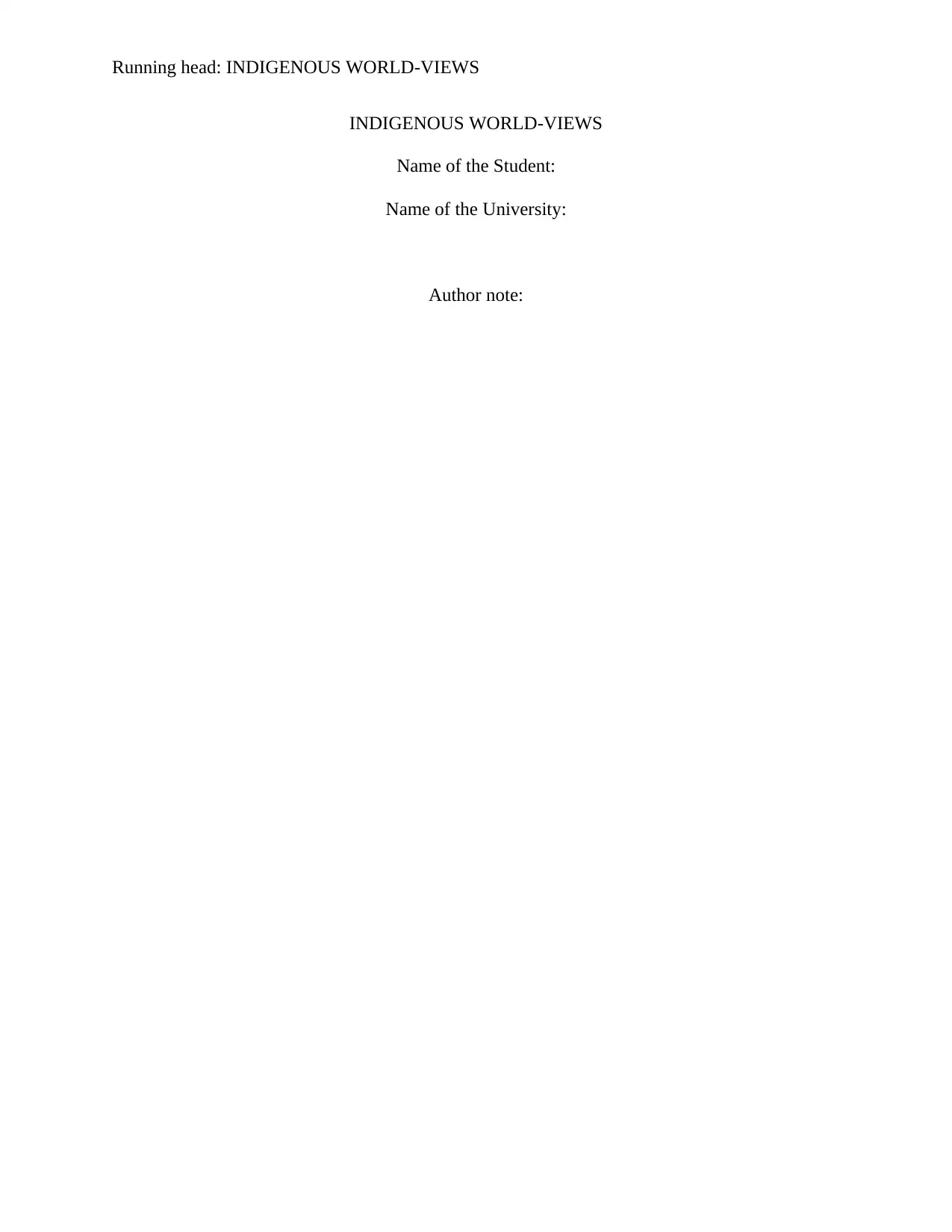
Running head: INDIGENOUS WORLD-VIEWS
INDIGENOUS WORLD-VIEWS
Name of the Student:
Name of the University:
Author note:
INDIGENOUS WORLD-VIEWS
Name of the Student:
Name of the University:
Author note:
Paraphrase This Document
Need a fresh take? Get an instant paraphrase of this document with our AI Paraphraser
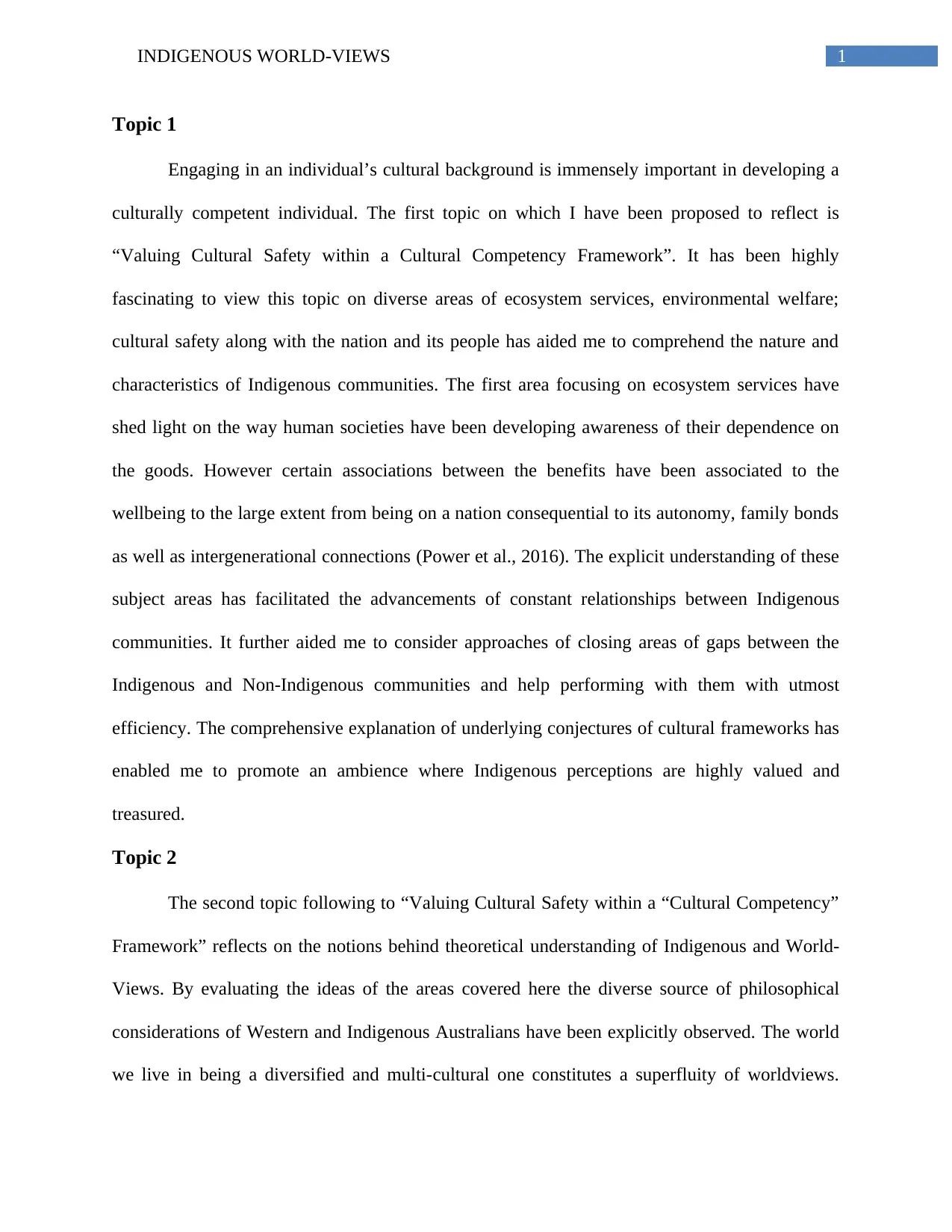
1INDIGENOUS WORLD-VIEWS
Topic 1
Engaging in an individual’s cultural background is immensely important in developing a
culturally competent individual. The first topic on which I have been proposed to reflect is
“Valuing Cultural Safety within a Cultural Competency Framework”. It has been highly
fascinating to view this topic on diverse areas of ecosystem services, environmental welfare;
cultural safety along with the nation and its people has aided me to comprehend the nature and
characteristics of Indigenous communities. The first area focusing on ecosystem services have
shed light on the way human societies have been developing awareness of their dependence on
the goods. However certain associations between the benefits have been associated to the
wellbeing to the large extent from being on a nation consequential to its autonomy, family bonds
as well as intergenerational connections (Power et al., 2016). The explicit understanding of these
subject areas has facilitated the advancements of constant relationships between Indigenous
communities. It further aided me to consider approaches of closing areas of gaps between the
Indigenous and Non-Indigenous communities and help performing with them with utmost
efficiency. The comprehensive explanation of underlying conjectures of cultural frameworks has
enabled me to promote an ambience where Indigenous perceptions are highly valued and
treasured.
Topic 2
The second topic following to “Valuing Cultural Safety within a “Cultural Competency”
Framework” reflects on the notions behind theoretical understanding of Indigenous and World-
Views. By evaluating the ideas of the areas covered here the diverse source of philosophical
considerations of Western and Indigenous Australians have been explicitly observed. The world
we live in being a diversified and multi-cultural one constitutes a superfluity of worldviews.
Topic 1
Engaging in an individual’s cultural background is immensely important in developing a
culturally competent individual. The first topic on which I have been proposed to reflect is
“Valuing Cultural Safety within a Cultural Competency Framework”. It has been highly
fascinating to view this topic on diverse areas of ecosystem services, environmental welfare;
cultural safety along with the nation and its people has aided me to comprehend the nature and
characteristics of Indigenous communities. The first area focusing on ecosystem services have
shed light on the way human societies have been developing awareness of their dependence on
the goods. However certain associations between the benefits have been associated to the
wellbeing to the large extent from being on a nation consequential to its autonomy, family bonds
as well as intergenerational connections (Power et al., 2016). The explicit understanding of these
subject areas has facilitated the advancements of constant relationships between Indigenous
communities. It further aided me to consider approaches of closing areas of gaps between the
Indigenous and Non-Indigenous communities and help performing with them with utmost
efficiency. The comprehensive explanation of underlying conjectures of cultural frameworks has
enabled me to promote an ambience where Indigenous perceptions are highly valued and
treasured.
Topic 2
The second topic following to “Valuing Cultural Safety within a “Cultural Competency”
Framework” reflects on the notions behind theoretical understanding of Indigenous and World-
Views. By evaluating the ideas of the areas covered here the diverse source of philosophical
considerations of Western and Indigenous Australians have been explicitly observed. The world
we live in being a diversified and multi-cultural one constitutes a superfluity of worldviews.
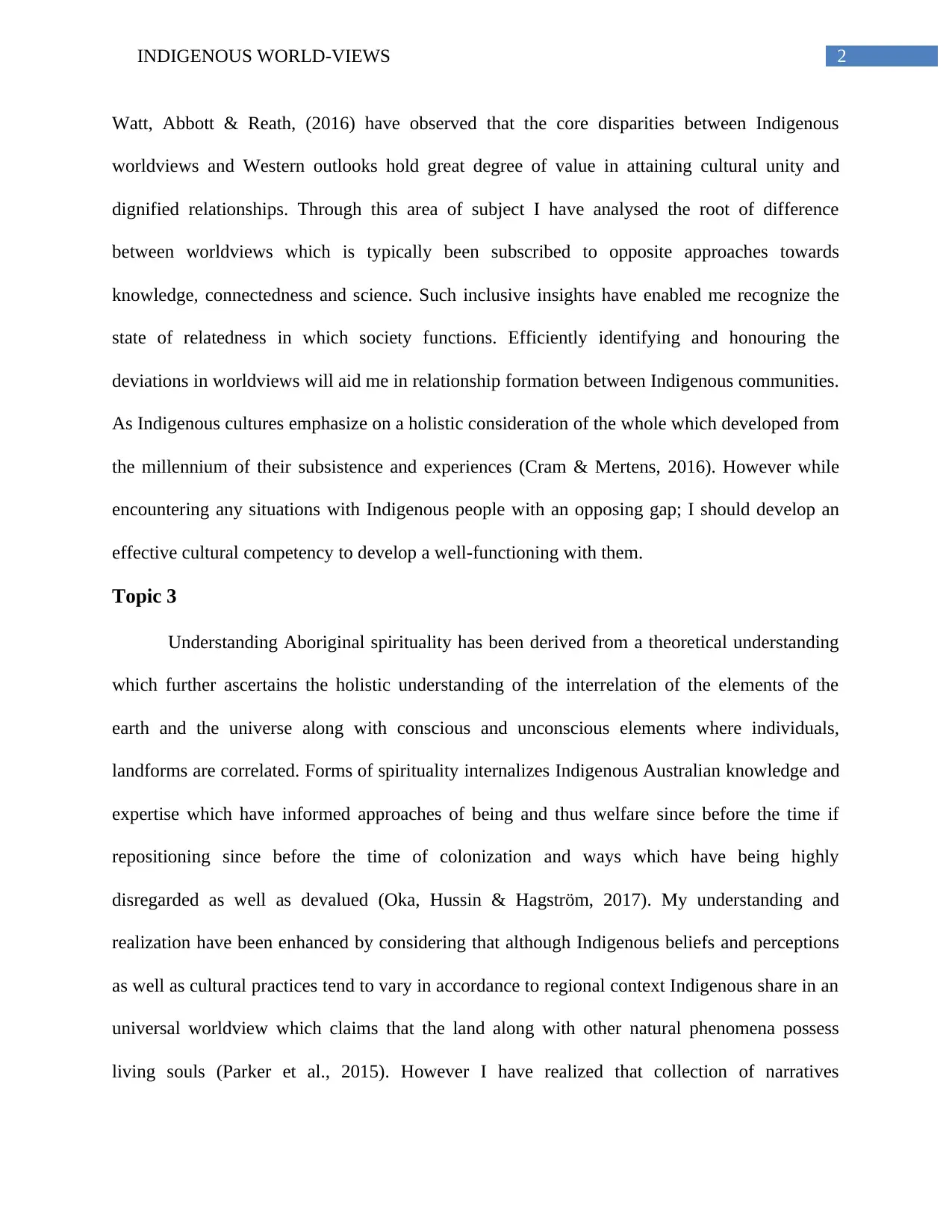
2INDIGENOUS WORLD-VIEWS
Watt, Abbott & Reath, (2016) have observed that the core disparities between Indigenous
worldviews and Western outlooks hold great degree of value in attaining cultural unity and
dignified relationships. Through this area of subject I have analysed the root of difference
between worldviews which is typically been subscribed to opposite approaches towards
knowledge, connectedness and science. Such inclusive insights have enabled me recognize the
state of relatedness in which society functions. Efficiently identifying and honouring the
deviations in worldviews will aid me in relationship formation between Indigenous communities.
As Indigenous cultures emphasize on a holistic consideration of the whole which developed from
the millennium of their subsistence and experiences (Cram & Mertens, 2016). However while
encountering any situations with Indigenous people with an opposing gap; I should develop an
effective cultural competency to develop a well-functioning with them.
Topic 3
Understanding Aboriginal spirituality has been derived from a theoretical understanding
which further ascertains the holistic understanding of the interrelation of the elements of the
earth and the universe along with conscious and unconscious elements where individuals,
landforms are correlated. Forms of spirituality internalizes Indigenous Australian knowledge and
expertise which have informed approaches of being and thus welfare since before the time if
repositioning since before the time of colonization and ways which have being highly
disregarded as well as devalued (Oka, Hussin & Hagström, 2017). My understanding and
realization have been enhanced by considering that although Indigenous beliefs and perceptions
as well as cultural practices tend to vary in accordance to regional context Indigenous share in an
universal worldview which claims that the land along with other natural phenomena possess
living souls (Parker et al., 2015). However I have realized that collection of narratives
Watt, Abbott & Reath, (2016) have observed that the core disparities between Indigenous
worldviews and Western outlooks hold great degree of value in attaining cultural unity and
dignified relationships. Through this area of subject I have analysed the root of difference
between worldviews which is typically been subscribed to opposite approaches towards
knowledge, connectedness and science. Such inclusive insights have enabled me recognize the
state of relatedness in which society functions. Efficiently identifying and honouring the
deviations in worldviews will aid me in relationship formation between Indigenous communities.
As Indigenous cultures emphasize on a holistic consideration of the whole which developed from
the millennium of their subsistence and experiences (Cram & Mertens, 2016). However while
encountering any situations with Indigenous people with an opposing gap; I should develop an
effective cultural competency to develop a well-functioning with them.
Topic 3
Understanding Aboriginal spirituality has been derived from a theoretical understanding
which further ascertains the holistic understanding of the interrelation of the elements of the
earth and the universe along with conscious and unconscious elements where individuals,
landforms are correlated. Forms of spirituality internalizes Indigenous Australian knowledge and
expertise which have informed approaches of being and thus welfare since before the time if
repositioning since before the time of colonization and ways which have being highly
disregarded as well as devalued (Oka, Hussin & Hagström, 2017). My understanding and
realization have been enhanced by considering that although Indigenous beliefs and perceptions
as well as cultural practices tend to vary in accordance to regional context Indigenous share in an
universal worldview which claims that the land along with other natural phenomena possess
living souls (Parker et al., 2015). However I have realized that collection of narratives
⊘ This is a preview!⊘
Do you want full access?
Subscribe today to unlock all pages.

Trusted by 1+ million students worldwide
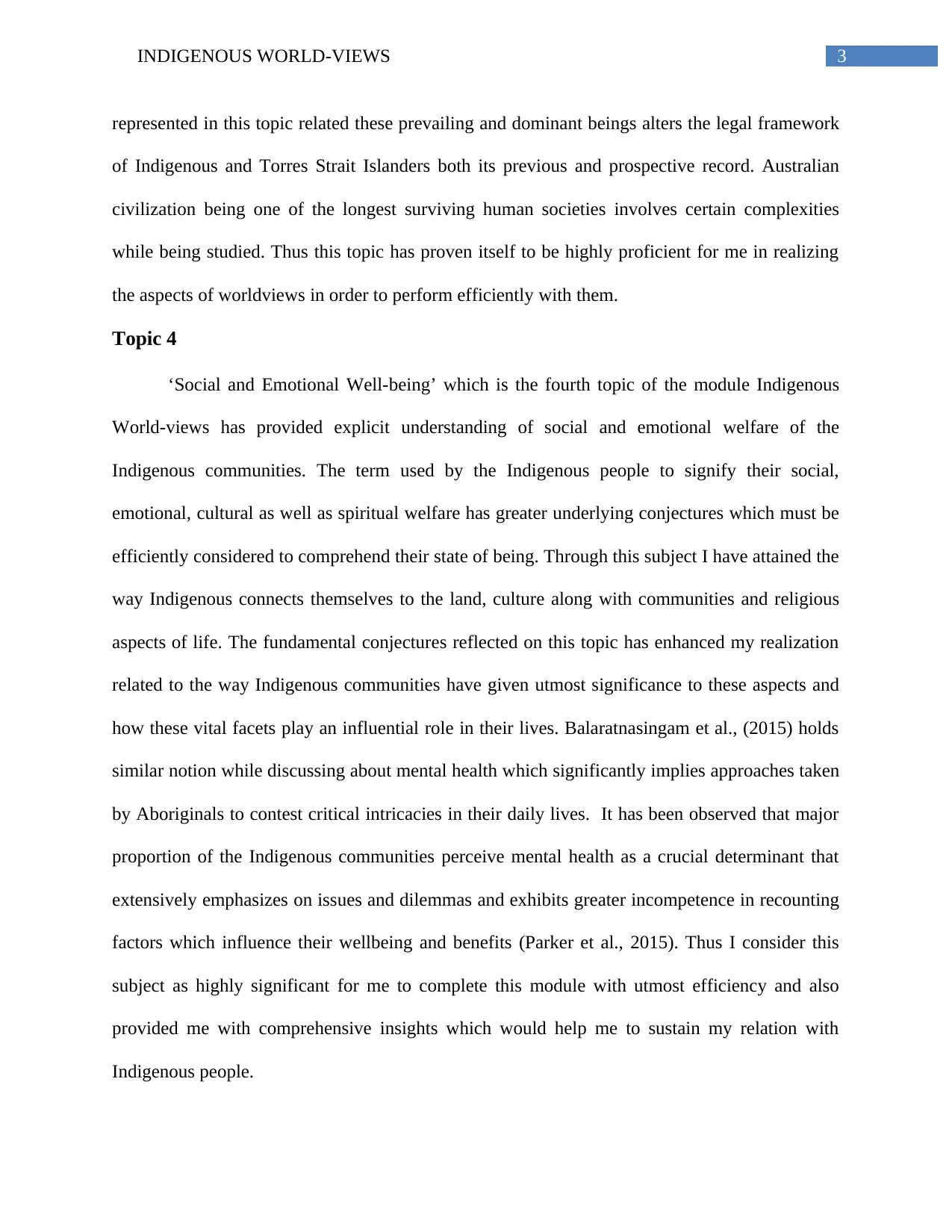
3INDIGENOUS WORLD-VIEWS
represented in this topic related these prevailing and dominant beings alters the legal framework
of Indigenous and Torres Strait Islanders both its previous and prospective record. Australian
civilization being one of the longest surviving human societies involves certain complexities
while being studied. Thus this topic has proven itself to be highly proficient for me in realizing
the aspects of worldviews in order to perform efficiently with them.
Topic 4
‘Social and Emotional Well-being’ which is the fourth topic of the module Indigenous
World-views has provided explicit understanding of social and emotional welfare of the
Indigenous communities. The term used by the Indigenous people to signify their social,
emotional, cultural as well as spiritual welfare has greater underlying conjectures which must be
efficiently considered to comprehend their state of being. Through this subject I have attained the
way Indigenous connects themselves to the land, culture along with communities and religious
aspects of life. The fundamental conjectures reflected on this topic has enhanced my realization
related to the way Indigenous communities have given utmost significance to these aspects and
how these vital facets play an influential role in their lives. Balaratnasingam et al., (2015) holds
similar notion while discussing about mental health which significantly implies approaches taken
by Aboriginals to contest critical intricacies in their daily lives. It has been observed that major
proportion of the Indigenous communities perceive mental health as a crucial determinant that
extensively emphasizes on issues and dilemmas and exhibits greater incompetence in recounting
factors which influence their wellbeing and benefits (Parker et al., 2015). Thus I consider this
subject as highly significant for me to complete this module with utmost efficiency and also
provided me with comprehensive insights which would help me to sustain my relation with
Indigenous people.
represented in this topic related these prevailing and dominant beings alters the legal framework
of Indigenous and Torres Strait Islanders both its previous and prospective record. Australian
civilization being one of the longest surviving human societies involves certain complexities
while being studied. Thus this topic has proven itself to be highly proficient for me in realizing
the aspects of worldviews in order to perform efficiently with them.
Topic 4
‘Social and Emotional Well-being’ which is the fourth topic of the module Indigenous
World-views has provided explicit understanding of social and emotional welfare of the
Indigenous communities. The term used by the Indigenous people to signify their social,
emotional, cultural as well as spiritual welfare has greater underlying conjectures which must be
efficiently considered to comprehend their state of being. Through this subject I have attained the
way Indigenous connects themselves to the land, culture along with communities and religious
aspects of life. The fundamental conjectures reflected on this topic has enhanced my realization
related to the way Indigenous communities have given utmost significance to these aspects and
how these vital facets play an influential role in their lives. Balaratnasingam et al., (2015) holds
similar notion while discussing about mental health which significantly implies approaches taken
by Aboriginals to contest critical intricacies in their daily lives. It has been observed that major
proportion of the Indigenous communities perceive mental health as a crucial determinant that
extensively emphasizes on issues and dilemmas and exhibits greater incompetence in recounting
factors which influence their wellbeing and benefits (Parker et al., 2015). Thus I consider this
subject as highly significant for me to complete this module with utmost efficiency and also
provided me with comprehensive insights which would help me to sustain my relation with
Indigenous people.
Paraphrase This Document
Need a fresh take? Get an instant paraphrase of this document with our AI Paraphraser
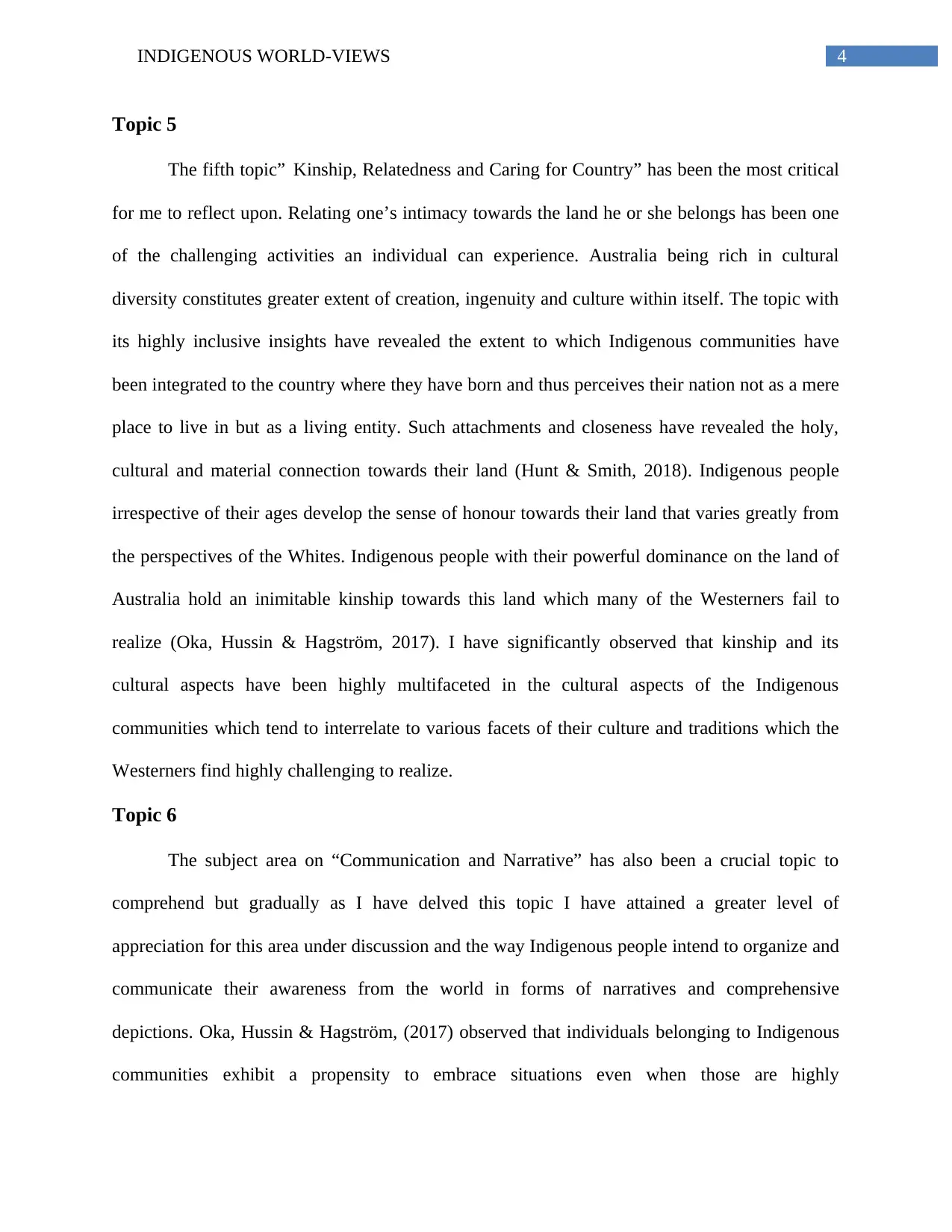
4INDIGENOUS WORLD-VIEWS
Topic 5
The fifth topic” Kinship, Relatedness and Caring for Country” has been the most critical
for me to reflect upon. Relating one’s intimacy towards the land he or she belongs has been one
of the challenging activities an individual can experience. Australia being rich in cultural
diversity constitutes greater extent of creation, ingenuity and culture within itself. The topic with
its highly inclusive insights have revealed the extent to which Indigenous communities have
been integrated to the country where they have born and thus perceives their nation not as a mere
place to live in but as a living entity. Such attachments and closeness have revealed the holy,
cultural and material connection towards their land (Hunt & Smith, 2018). Indigenous people
irrespective of their ages develop the sense of honour towards their land that varies greatly from
the perspectives of the Whites. Indigenous people with their powerful dominance on the land of
Australia hold an inimitable kinship towards this land which many of the Westerners fail to
realize (Oka, Hussin & Hagström, 2017). I have significantly observed that kinship and its
cultural aspects have been highly multifaceted in the cultural aspects of the Indigenous
communities which tend to interrelate to various facets of their culture and traditions which the
Westerners find highly challenging to realize.
Topic 6
The subject area on “Communication and Narrative” has also been a crucial topic to
comprehend but gradually as I have delved this topic I have attained a greater level of
appreciation for this area under discussion and the way Indigenous people intend to organize and
communicate their awareness from the world in forms of narratives and comprehensive
depictions. Oka, Hussin & Hagström, (2017) observed that individuals belonging to Indigenous
communities exhibit a propensity to embrace situations even when those are highly
Topic 5
The fifth topic” Kinship, Relatedness and Caring for Country” has been the most critical
for me to reflect upon. Relating one’s intimacy towards the land he or she belongs has been one
of the challenging activities an individual can experience. Australia being rich in cultural
diversity constitutes greater extent of creation, ingenuity and culture within itself. The topic with
its highly inclusive insights have revealed the extent to which Indigenous communities have
been integrated to the country where they have born and thus perceives their nation not as a mere
place to live in but as a living entity. Such attachments and closeness have revealed the holy,
cultural and material connection towards their land (Hunt & Smith, 2018). Indigenous people
irrespective of their ages develop the sense of honour towards their land that varies greatly from
the perspectives of the Whites. Indigenous people with their powerful dominance on the land of
Australia hold an inimitable kinship towards this land which many of the Westerners fail to
realize (Oka, Hussin & Hagström, 2017). I have significantly observed that kinship and its
cultural aspects have been highly multifaceted in the cultural aspects of the Indigenous
communities which tend to interrelate to various facets of their culture and traditions which the
Westerners find highly challenging to realize.
Topic 6
The subject area on “Communication and Narrative” has also been a crucial topic to
comprehend but gradually as I have delved this topic I have attained a greater level of
appreciation for this area under discussion and the way Indigenous people intend to organize and
communicate their awareness from the world in forms of narratives and comprehensive
depictions. Oka, Hussin & Hagström, (2017) observed that individuals belonging to Indigenous
communities exhibit a propensity to embrace situations even when those are highly
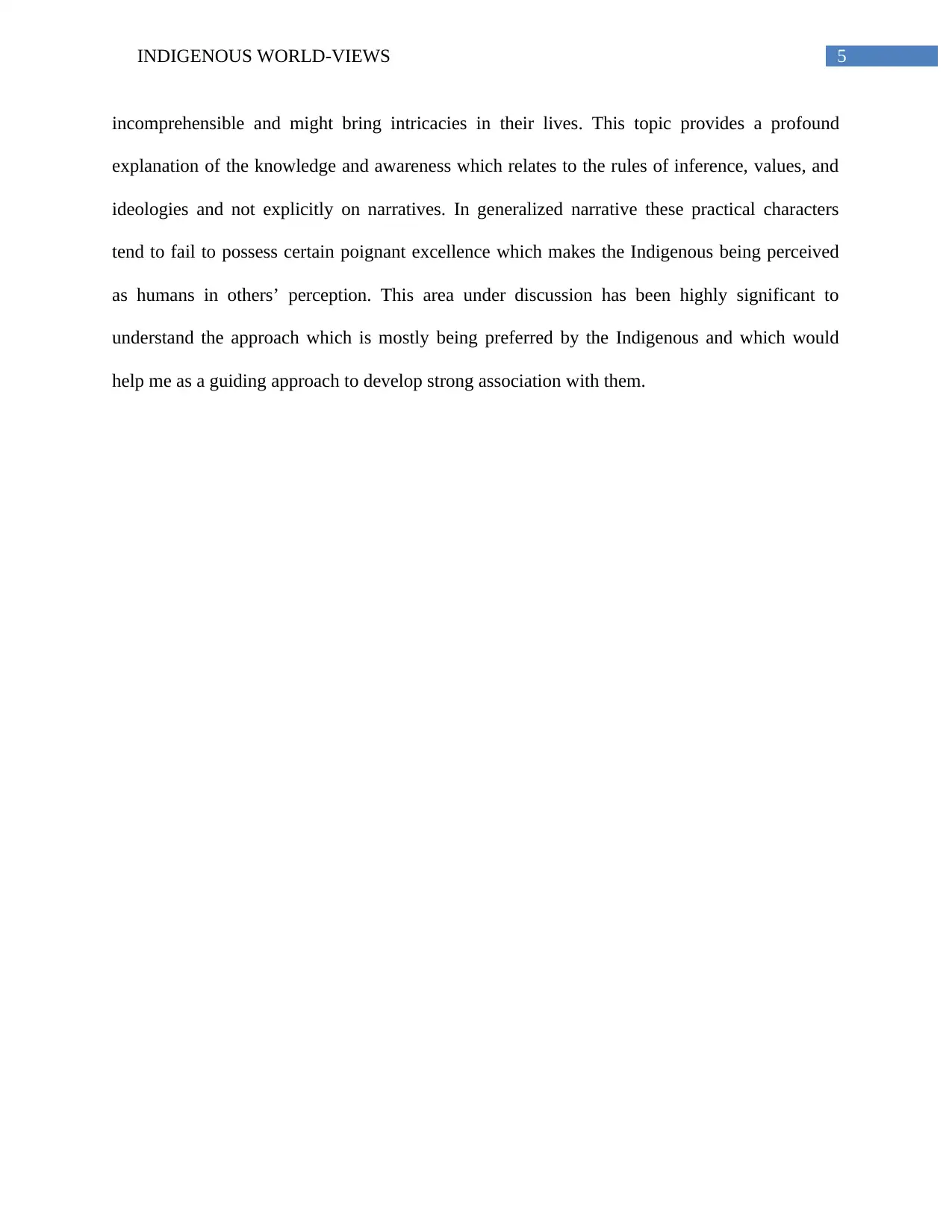
5INDIGENOUS WORLD-VIEWS
incomprehensible and might bring intricacies in their lives. This topic provides a profound
explanation of the knowledge and awareness which relates to the rules of inference, values, and
ideologies and not explicitly on narratives. In generalized narrative these practical characters
tend to fail to possess certain poignant excellence which makes the Indigenous being perceived
as humans in others’ perception. This area under discussion has been highly significant to
understand the approach which is mostly being preferred by the Indigenous and which would
help me as a guiding approach to develop strong association with them.
incomprehensible and might bring intricacies in their lives. This topic provides a profound
explanation of the knowledge and awareness which relates to the rules of inference, values, and
ideologies and not explicitly on narratives. In generalized narrative these practical characters
tend to fail to possess certain poignant excellence which makes the Indigenous being perceived
as humans in others’ perception. This area under discussion has been highly significant to
understand the approach which is mostly being preferred by the Indigenous and which would
help me as a guiding approach to develop strong association with them.
⊘ This is a preview!⊘
Do you want full access?
Subscribe today to unlock all pages.

Trusted by 1+ million students worldwide
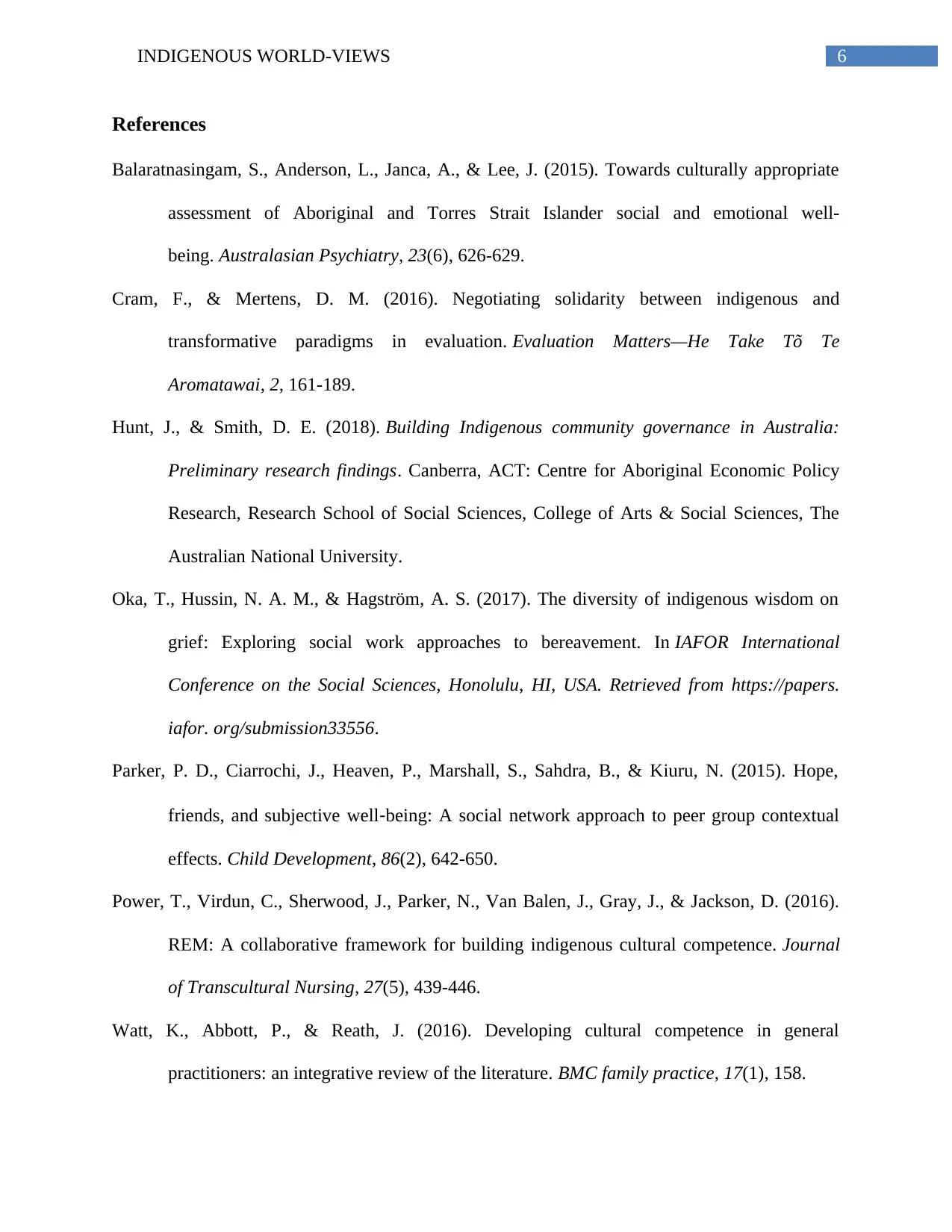
6INDIGENOUS WORLD-VIEWS
References
Balaratnasingam, S., Anderson, L., Janca, A., & Lee, J. (2015). Towards culturally appropriate
assessment of Aboriginal and Torres Strait Islander social and emotional well-
being. Australasian Psychiatry, 23(6), 626-629.
Cram, F., & Mertens, D. M. (2016). Negotiating solidarity between indigenous and
transformative paradigms in evaluation. Evaluation Matters—He Take Tõ Te
Aromatawai, 2, 161-189.
Hunt, J., & Smith, D. E. (2018). Building Indigenous community governance in Australia:
Preliminary research findings. Canberra, ACT: Centre for Aboriginal Economic Policy
Research, Research School of Social Sciences, College of Arts & Social Sciences, The
Australian National University.
Oka, T., Hussin, N. A. M., & Hagström, A. S. (2017). The diversity of indigenous wisdom on
grief: Exploring social work approaches to bereavement. In IAFOR International
Conference on the Social Sciences, Honolulu, HI, USA. Retrieved from https://papers.
iafor. org/submission33556.
Parker, P. D., Ciarrochi, J., Heaven, P., Marshall, S., Sahdra, B., & Kiuru, N. (2015). Hope,
friends, and subjective well‐being: A social network approach to peer group contextual
effects. Child Development, 86(2), 642-650.
Power, T., Virdun, C., Sherwood, J., Parker, N., Van Balen, J., Gray, J., & Jackson, D. (2016).
REM: A collaborative framework for building indigenous cultural competence. Journal
of Transcultural Nursing, 27(5), 439-446.
Watt, K., Abbott, P., & Reath, J. (2016). Developing cultural competence in general
practitioners: an integrative review of the literature. BMC family practice, 17(1), 158.
References
Balaratnasingam, S., Anderson, L., Janca, A., & Lee, J. (2015). Towards culturally appropriate
assessment of Aboriginal and Torres Strait Islander social and emotional well-
being. Australasian Psychiatry, 23(6), 626-629.
Cram, F., & Mertens, D. M. (2016). Negotiating solidarity between indigenous and
transformative paradigms in evaluation. Evaluation Matters—He Take Tõ Te
Aromatawai, 2, 161-189.
Hunt, J., & Smith, D. E. (2018). Building Indigenous community governance in Australia:
Preliminary research findings. Canberra, ACT: Centre for Aboriginal Economic Policy
Research, Research School of Social Sciences, College of Arts & Social Sciences, The
Australian National University.
Oka, T., Hussin, N. A. M., & Hagström, A. S. (2017). The diversity of indigenous wisdom on
grief: Exploring social work approaches to bereavement. In IAFOR International
Conference on the Social Sciences, Honolulu, HI, USA. Retrieved from https://papers.
iafor. org/submission33556.
Parker, P. D., Ciarrochi, J., Heaven, P., Marshall, S., Sahdra, B., & Kiuru, N. (2015). Hope,
friends, and subjective well‐being: A social network approach to peer group contextual
effects. Child Development, 86(2), 642-650.
Power, T., Virdun, C., Sherwood, J., Parker, N., Van Balen, J., Gray, J., & Jackson, D. (2016).
REM: A collaborative framework for building indigenous cultural competence. Journal
of Transcultural Nursing, 27(5), 439-446.
Watt, K., Abbott, P., & Reath, J. (2016). Developing cultural competence in general
practitioners: an integrative review of the literature. BMC family practice, 17(1), 158.
1 out of 7
Related Documents
Your All-in-One AI-Powered Toolkit for Academic Success.
+13062052269
info@desklib.com
Available 24*7 on WhatsApp / Email
![[object Object]](/_next/static/media/star-bottom.7253800d.svg)
Unlock your academic potential
Copyright © 2020–2026 A2Z Services. All Rights Reserved. Developed and managed by ZUCOL.





